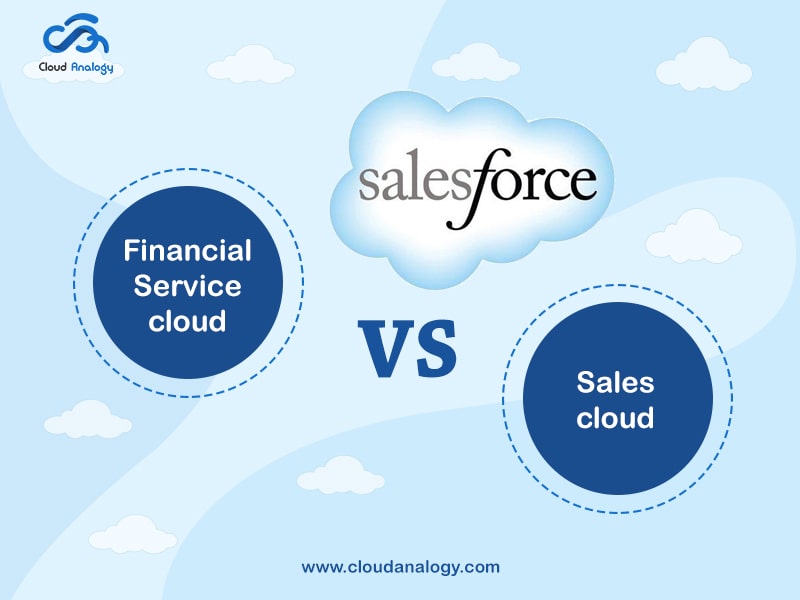How familiar is your organization with the integration and flexibility that Salesforce Financial Services Cloud offers? The solution helps your business in countless ways – strengthen client relationships, improve the customer experience, and drive new business by integrating sales, marketing, and service.
In this blog by Shweta Bajetha, a proud Lightning Champion, we will learn about what is Salesforce Financial Services Cloud, its primary features, and how it is different from Salesforce Sales Cloud.
What is Financial Services Cloud?
Salesforce Financial Services Cloud can be best described as a customer relationship management (CRM) solution to meet the specific requirements of the financial industry. Financial Services Cloud from Salesforce is built on the powerful and robust Salesforce Platform, both for B2B and B2C markets.
It is worthwhile to note here that the target audience of Financial Services Cloud are customers from the following segments:
- Wealth Management
- Insurance Property & Casualty
- Retail Banking
- Insurance Life and Annuities
An integrated platform designed to drive stronger client relationships, Financial Services Cloud from Salesforce is powered with an enhanced set of productivity and engagement features. This helps advisors proactively advice clients and deliver a concierge level of service. Salesforce Financial Services Cloud also helps advisors spend less time gathering client information and more time providing goal-based, holistic advice that helps them put their clients at the center of everything they do.
One of the biggest advantages of Salesforce Financial Services Cloud is its unique ability to transform how wealth and asset management, banking, and insurance companies work with customers, as well as internally.
Main Features Of Financial Services Cloud-Reasons To Choose
Advisor Analytics: Financial Services Cloud comes preloaded with a powerful Einstein Analytics artificial intelligence layer with five analytics dashboards embedded in the app:
- Client list: List of clients can be displayed that can be filtered according to different criteria.
- 80/20: A list of clients who generate the top 80% of revenue gets automatically displayed.
- Financial accounts: Helps in analyzing the different types of financial accounts and securities within your books of business. This helps you respond to market conditions quickly.
- Activities: Helps you discover how you are interacting with the clients and which activities are influencing client relationships. This lets you identify the right set of opportunities to improve your client engagement.
- Client goals: Helps you effortlessly measure client goals so that it is easy to spot trends and create tasks or opportunities to guide your clients on track.
Relationship Builder & Map: There is an opportunity in the system for tracking relationships between institutions and people along with an option for creating groups and knowing the role of each group member and viewing the relationships’ map.
Financial Accounts & Goals: Separate objects in the system for storing information about financial goals and accounts of clients.
Communities: Empower customers and partners by giving them access to Financial Services Cloud through Communities licenses for external users. Using Salesforce Financial Services Cloud, access can be provided of a client’s profile, including financial accounts, account details, and more, with Community Cloud.
Role-based Banker Console: Financial Services Cloud helps in modeling one-to-one relationships between people and businesses along with recording complex, multi-party relationships using groups. This helps in understanding the spheres of influence and spans of control.
How is Financial Service Cloud different from Sales Cloud?
Financial Services Cloud that is built on Salesforce, the world’s number 1 CRM solution, is empowered with out-of-the-box all the core Sales Cloud features, plus new custom fields and objects that model financial accounts, goals, assets, and liabilities for both individual clients and across entire households. In other words, Financial Service Cloud helps advisors save valuable time and money by letting them customize their CRM to speak the language of their organization.
Furthermore, Financial Service Cloud from Salesforce combined with Salesforce Shield provides a powerful suite of compliance features. This means that agents, firms, and advisors can adhere to new regulatory standards at scale.
The best thing about Financial Service Cloud from Salesforce is that it helps advisors easily drive visible and repeatable collaboration across the entire firm while keeping track of client communications and relationships. If this is not all, Salesforce Financial Service Cloud helps financial advisors, firms, and agents to establish consistent onboarding tasks to ensure that the best interests of the clients are always at the center of each interaction.
Need help with Salesforce Financial Services Cloud consultancy, administration, development, or customization? Contact Cloud Analogy now!










